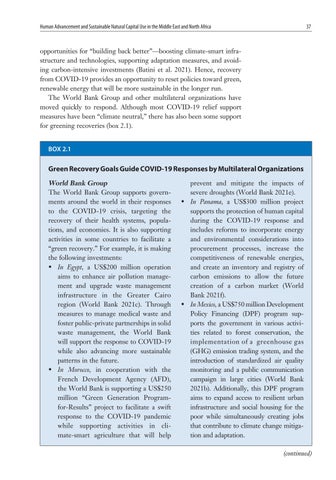Human Advancement and Sustainable Natural Capital Use in the Middle East and North Africa
37
opportunities for “building back better”—boosting climate-smart infrastructure and technologies, supporting adaptation measures, and avoiding carbon-intensive investments (Batini et al. 2021). Hence, recovery from COVID-19 provides an opportunity to reset policies toward green, renewable energy that will be more sustainable in the longer run. The World Bank Group and other multilateral organizations have moved quickly to respond. Although most COVID-19 relief support measures have been “climate neutral,” there has also been some support for greening recoveries (box 2.1). BOX 2.1
Green Recovery Goals Guide COVID-19 Responses by Multilateral Organizations World Bank Group The World Bank Group supports governments around the world in their responses to the COVID-19 crisis, targeting the recovery of their health systems, populations, and economies. It is also supporting activities in some countries to facilitate a “green recovery.” For example, it is making the following investments: • In Egypt, a US$200 million operation aims to enhance air pollution management and upgrade waste management infrastructure in the Greater Cairo region (World Bank 2021c). Through measures to manage medical waste and foster public-private partnerships in solid waste management, the World Bank will support the response to COVID-19 while also advancing more sustainable patterns in the future. • In Morocco, in cooperation with the French Development Agency (AFD), the World Bank is supporting a US$250 million “Green Generation Programfor-Results” project to facilitate a swift response to the COVID-19 pandemic while supporting activities in climate-smart agriculture that will help
prevent and mitigate the impacts of severe droughts (World Bank 2021e). • In Panama, a US$300 million project supports the protection of human capital during the COVID-19 response and includes reforms to incorporate energy and environmental considerations into procurement processes, increase the competitiveness of renewable energies, and create an inventory and registry of carbon emissions to allow the future creation of a carbon market (World Bank 2021f). • In Mexico, a US$750 million Development Policy Financing (DPF) program supports the government in various activities related to forest conservation, the implementation of a greenhouse gas (GHG) emission trading system, and the introduction of standardized air quality monitoring and a public communication campaign in large cities (World Bank 2021b). Additionally, this DPF program aims to expand access to resilient urban infrastructure and social housing for the poor while simultaneously creating jobs that contribute to climate change mitigation and adaptation. (continued)






